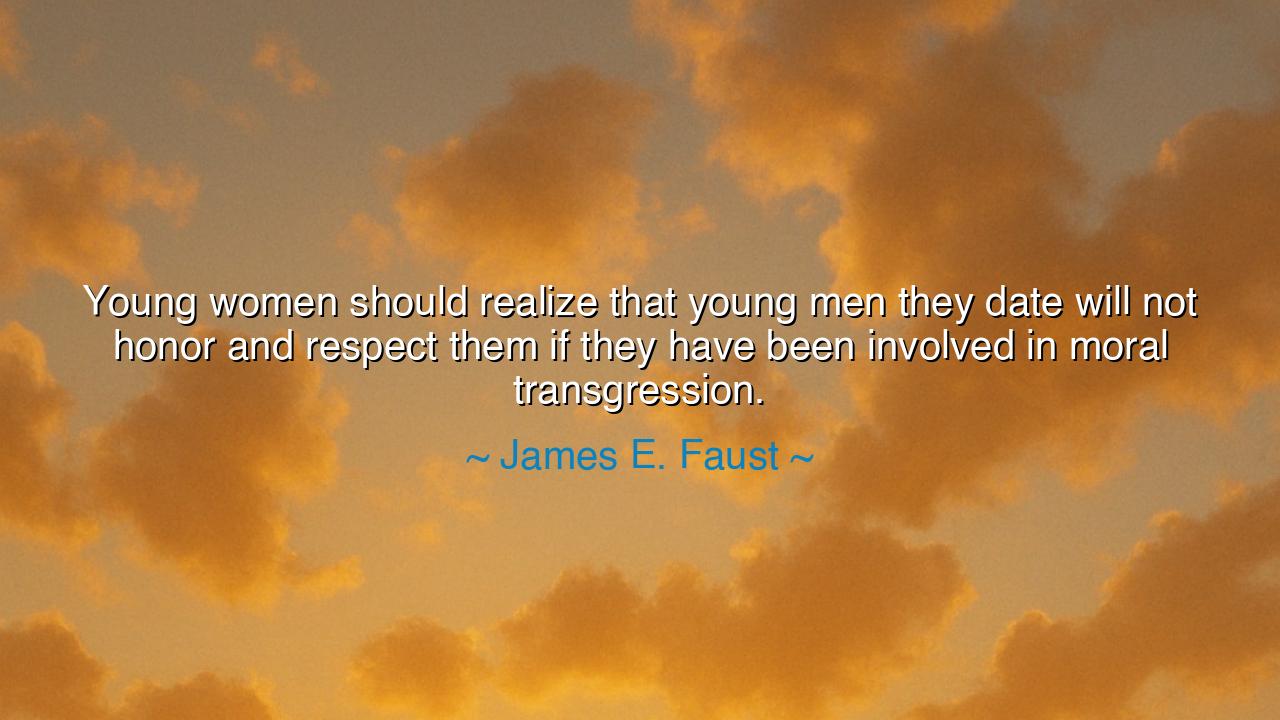
Young women should realize that young men they date will not
Young women should realize that young men they date will not honor and respect them if they have been involved in moral transgression.






Hear now, O children of time, the words of James E. Faust, who declared: “Young women should realize that young men they date will not honor and respect them if they have been involved in moral transgression.” This utterance, stern and solemn, springs not from disdain, but from the ancient understanding of the fragile bond between purity, trust, and the reverence of men toward women. In every age, the honor of the heart has been a jewel—rare, delicate, and luminous—and those who carry it faithfully are adorned with a strength that no earthly beauty can rival.
The meaning of these words rests not merely upon outward conduct, but upon the sacred perception of virtue itself. A woman’s dignity, when preserved in chastity, becomes like a crown of fire upon her brow. In contrast, when one partakes in moral transgression, her worth may be diminished in the eyes of men who measure devotion by purity. It is a harsh reality, born not of divine decree but of human frailty, for men, though called to honor, often falter when faced with their own pride and weakness. Thus, Faust warns not only of sin itself but of the aftermath—that the choices of youth shape how love, loyalty, and respect are granted in the years to come.
Consider, for example, the tale of Lucretia of Rome, famed for her chastity and fidelity. Though wronged by violence, her purity of heart remained untarnished. Yet in her despair, she believed even the shadow of transgression—though forced upon her—would tarnish her honor in the eyes of men. Her tragic end became the spark that ignited Rome’s cry for justice, and her name, centuries later, still stands as a monument to the ancient belief that virtue is life’s most precious safeguard. This story reveals both the cruelty of societal judgment and the unyielding power that purity has held in shaping the respect of men toward women.
The origin of Faust’s warning lies within the timeless wisdom of scripture and tradition, where prophets and sages counseled young hearts to guard their virtue. From the Hebrew psalms to the teachings of early Christian fathers, the refrain is the same: purity is a shield, not only before God but also before mankind. Faust, speaking in modern times, echoed the voice of ages past, urging youth to perceive not only the eternal consequences of sin but also the mortal ones—the altered gaze, the diminished trust, the fractured respect that can linger between man and woman when sacred boundaries are crossed.
Yet let us not read these words as condemnation alone, but also as a call to wisdom. For men are flawed, and their judgments are imperfect. It should not be so—that respect depends upon unblemished virtue—but alas, the world bends often to weakness. Knowing this, young women are counseled to walk with discernment, to keep their dignity intact, and to choose wisely whom they grant their trust. At the same time, young men are summoned to greater honor—that they may respect women for their hearts, their minds, their courage, and their divine worth, not only for their innocence.
The emotional lesson resounds like a bell across generations: every choice carves a path, every step echoes into the future. Purity, in this sense, is not merely the absence of sin but the presence of self-respect, the shield of dignity that commands honor. To lose it recklessly is to cast away one’s armor and to enter the battlefield of love unguarded, vulnerable to scorn, betrayal, or dismissal.
Therefore, O daughters and sons of tomorrow, let this wisdom rest upon your hearts: cherish your virtue, guard your dignity, and walk with reverence for yourselves and others. Let the flame of respect burn not only in how others see you but in how you see yourself. Choose companions who uplift, who honor you not only in purity but in spirit, who treasure you as more than a fleeting desire. And should you falter, rise again with strength, for the worth of a soul is never wholly lost when repentance and renewal are sought with sincerity.
Practical action lies before you: young women, set firm boundaries, choose wisely those who seek your affection, and remember that your dignity is a gift greater than gold. Young men, learn to honor not only purity but personhood itself, granting respect to women for the fullness of their divine identity. Let both walk together in chastity and in love, building relationships not upon fleeting passion but upon eternal trust. Thus will honor and respect flourish, and love endure beyond the tempests of youth.






AAdministratorAdministrator
Welcome, honored guests. Please leave a comment, we will respond soon